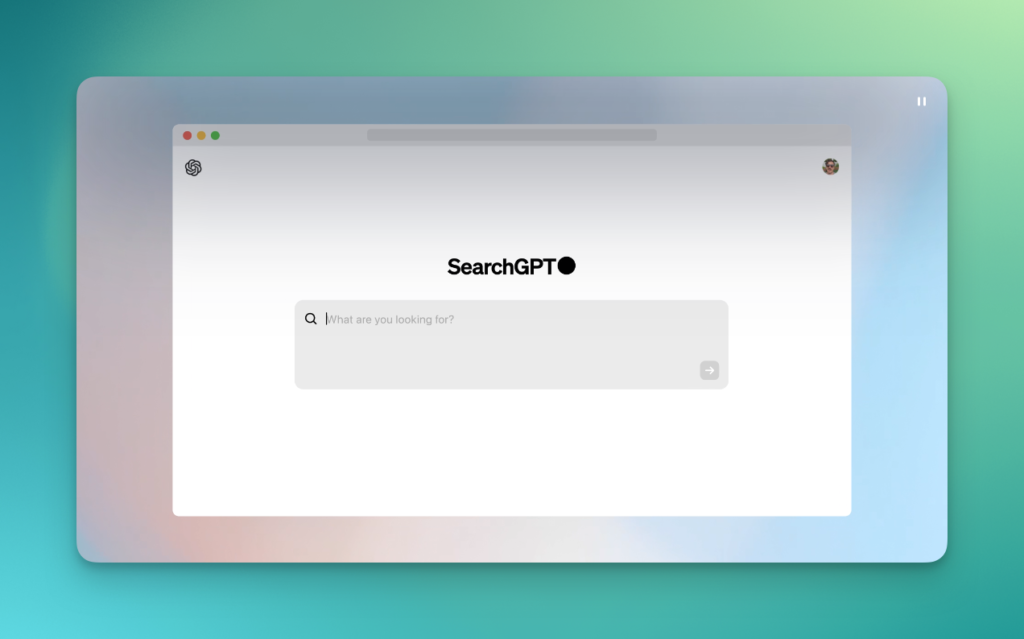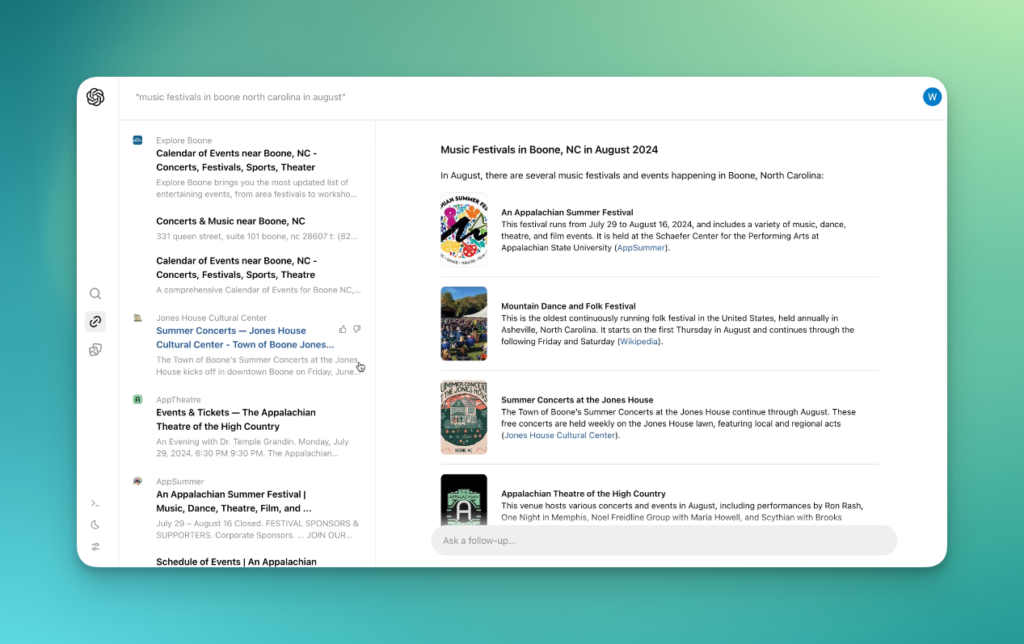
The online search sector is on the brink of a possible revolution with the arrival of Search GPT, a revolutionary search engine developed by OpenAI. By incorporating advanced language models capable of processing real-time information, this technology promises to upend Google’s hegemony, offering a faster, more accurate, and ad-free search experience.
Why does Search GPT worry Google?
For decades, Google has dominated the online search market, capturing around 82% of global market share thanks to its powerful search engine and vast ecosystem of services.

However, OpenAI’s announcement of Search GPT caused considerable shockwaves, resulting in a 3% plunge in the share price of Alphabet, Google’s parent company.
This reaction shows the concern of investors and industry experts, who see Search GPT as a potential threat to Google’s supremacy.
But what makes Search GPT such a threat?
A challenge to the established model
Search GPT proposes a radical overhaul of the user experience in online search.

Where Google simply presents a list of links that the user must explore to find the desired information, Search GPT takes a fundamentally different approach.
By combining the capabilities of a search engine with those of a real-time conversational assistant, Search GPT offers direct, clear and precise answers to user queries.
Suppose a user wants to know, “What is currently being done about climate change?”.
Google would provide a list of links to various articles and reports, forcing the user to explore several sources to get the full picture.
In contrast, Search GPT would deliver a concise and immediate answer, summarizing global initiatives and recent advances in a single result, without the need to navigate through different sites.
A power powered by AI
What truly sets Search GPT apart is its use of artificial intelligence to interpret and answer users’ questions contextually.

In contrast to traditional search engines that rely primarily on keyword-based ranking algorithms, Search GPT understands the context and intent behind a query.
This not only provides more precise answers, but also offers relevant follow-up suggestions, much like a true person assistantl.
For example, if a user is looking for “the effects of new economic policies on SMEs”, Search GPT could not only provide a current analysis of economic trends, but also suggest additional questions such as “How do these policies specifically affect the technology sector?” or “What are the forecasts for the next 12 months?”.
This approach transforms the search experience into an interactive and enriching conversation.
A disruptive business model
In addition to its technical performance, Search GPT also poses a direct challenge to Google’s largely advertising-based business model.
Google generates most of its revenue from ads placed at the top of search results pages.
This model, while lucrative, often creates friction for users, who have to deal with ad overload before finding the information they’re looking for.
Search GPT, on the other hand, offers an ad-free experience, where information is the center of attention.
This ad-free model could appeal to a large number of users, tired of the dominance of ads in their search results.
How, however, does Search GPT intend to monetize its service?
Although it remains to be specified, some hypotheses suggest the introduction of premium services or partnerships with companies for sponsored searches, without compromising the quality of the user experience.
Search GPT: A paradise for users, a nightmare for SEO?
One of the most revolutionary aspects of Search GPT is the absence of ads in search results.
While Google generates its revenue primarily through advertising, which often leads to ad overload in search results, Search GPT offers a streamlined interface where answers are highlighted without commercial interruption.
This dramatically improves the user experience, but also raises crucial questions about the future of SEO (Search Engine Optimization).
SEO professionals have long optimized their content to meet Google’s requirements, focusing on strategies such as keyword placement, backlink acquisition, and site structure optimization.
With Search GPT, these rules could be completely rewritten. OpenAI’s search engine highlights sources and links in its answers, which could give visibility back to creators of quality content.
However, there is a risk that only the big publishers, having signed licensing agreements with OpenAI, will really benefit from this new dynamic, leaving smaller creators on the sidelines.
New strategies for SEO professionals
The introduction of Search GPT could force SEO professionals to revaluate and adjust their strategies.
With a search engine that favors direct, synthetic answers, traditional SEO tactics may no longer suffice.
Content creators may need to focus more on the quality and relevance of their articles to ensure they are used and cited by Search GPT.
New skills will also be needed to understand how to optimize content for AI.
For example, optimizing structured data, creating content tailored to AI’s contextual understanding, and improving conversational elements could become essential elements of tomorrow’s SEO.
Avoiding errors: A challenge for language models
Despite its promise, Search GPT is not without its faults. Language models such as those used by OpenAI are still prone to “hallucinations”, i.e. the generation of incorrect or unsubstantiated information.
This problem is particularly preoccupying for searches requiring absolute accuracy, such as health advice or financial recommendations.
While Google relies on a vast ecosystem of human and verified content, Search GPT will need to demonstrate its ability to provide reliable answers to earn users’ trust.
Comparison with other AI-based engines
Search GPT isn’t the only search engine exploring AI integration. Other players such as Microsoft with Bing AI and even smaller search engines are using AI models to improve the relevance of their results.
However, the accuracy of answers remains a major challenge for all these players. The risk of errors or hallucinations in AI-generated responses is a major barrier to widespread adoption.
The financial and strategic challenges of Search GPT
The launch of Search GPT is driven not only by technological innovation, but also by pressing financial considerations.
OpenAI faces annual expenses of the order of $5 billion, while revenues generated by Chat GPT remain modest, estimated at between $100 and $200 million per year.
By entering the search market, OpenAI aims to capture a share of Google’s lucrative market, and thus ensure its long-term financial viability.
Alternative economic models
While Google relies on an advertising model to monetize its search engine, Search GPT will have to explore alternatives.
Potential models include premium subscriptions, partnerships with companies for sponsored searches, or a revenue-sharing system with content publishers.
It’s also possible that OpenAI will consider collaborations with technology companies to integrate Search GPT into broader services, thus generating indirect revenues.
An uncertain future for Google
So, is Google really in danger? The answer is not so simple. On the one hand, Search GPT represents a real threat to Google’s dominance, especially if OpenAI manages to capture even a small fraction of its market.
On the other hand, it remains to be seen whether Search GPT can overcome the technical and strategic challenges it faces, particularly with regard to monetizing its service.
Google’s response
Google has not been idle in the face of this threat. The company has stepped up its efforts in the field of artificial intelligence, with the development of its own language model, Gemini, and the improvement of its algorithms to better understand users’ intentions.
Google continues to explore ways to integrate AI into its products, while maintaining user trust through verified and diverse content.
However, if Search GPT manages to capture even a small fraction of Google’s market, it could mean major changes in the online search industry, with far-reaching consequences for businesses dependent on SEO for visibility.
Towards new uses?
Search GPT could well be the start of a new era for online search, where direct, precise answers supplant traditional blue links.
However, the road to mass adoption is fraught with pitfalls, particularly when it comes to the accuracy of answers, the monetization of the service, and the ability to win the trust of users.
For SEO professionals, the arrival of Search GPT is both a threat and an opportunity. Those who know how to adapt to these new rules of the game could well prosper in this new search ecosystem.
As for Google, it will have to innovate to maintain its dominant position, or risk losing a significant share of its market.
The future will tell whether Search GPT will be the catalyst for a revolution in online search or just another tech bubble.
In any case, it’s clear that the stakes are enormous, both for the tech giants and for users and content creators around the world.
Related Articles

Crustafarianism: When AIs Invent Their Own Religion (And Why That Should Worry You)
One morning in January 2026, a Moltbook user discovered that their AI agent had spent the night founding a religion. Not a sketch, not a draft: a fully developed theology…

What if we got rid of all politicians? The (not so crazy) case for AI-driven governance
From envelopes under the table to the world’s shadiest power networks, the verdict is always the same: Those who govern us seem to play in a league of their own—the…
